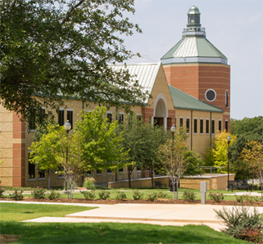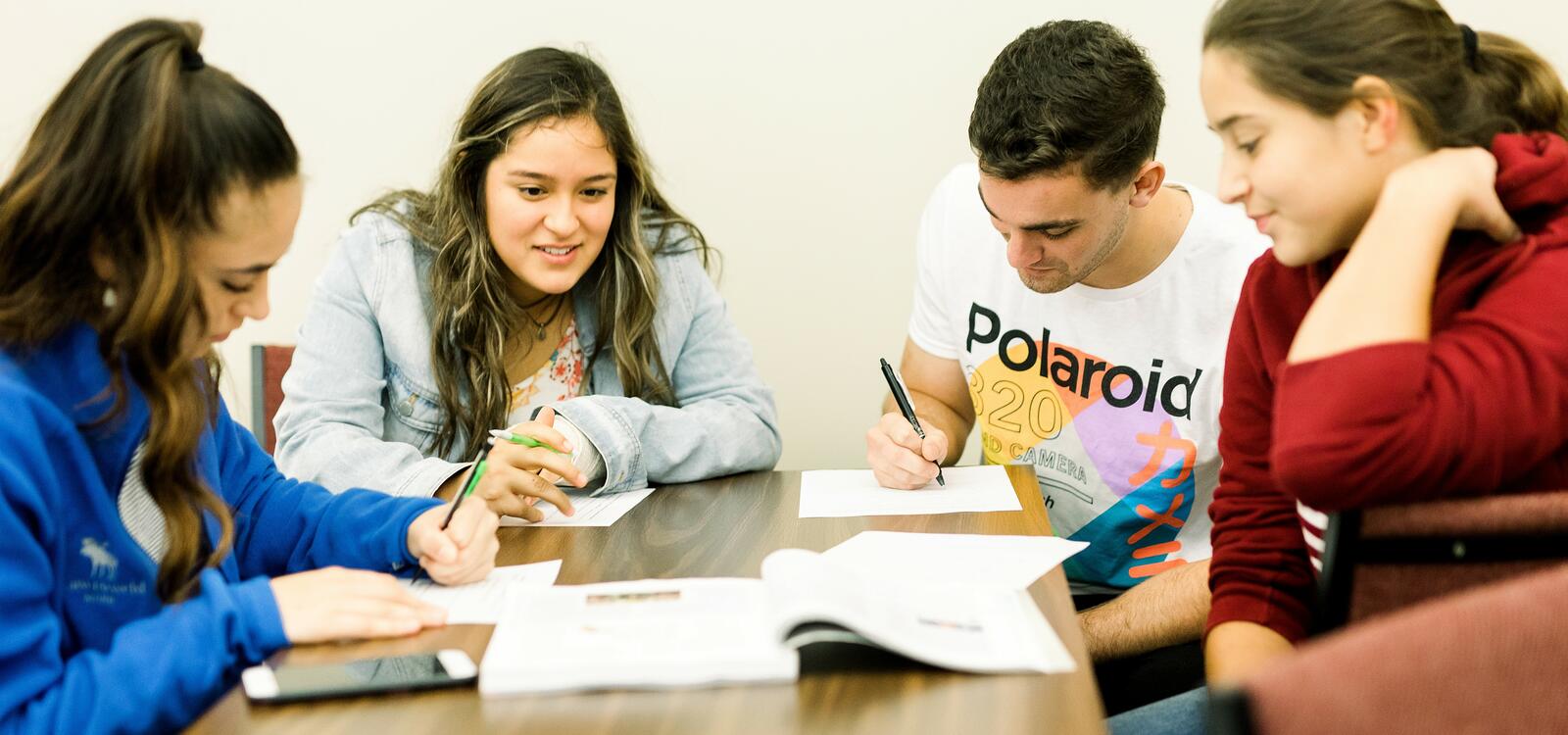Federal & State Aid
Grants
Eligibility for the following programs is based upon receipt and evaluation of the result of the Free Application for Federal Student Aid (FAFSA).
Federal Pell Grant
$639 to $6,345
This is a federally funded grant available to undergraduate students enrolled in a program leading to a degree. The actual award for each student is determined by the U.S. Department of Education through evaluation of the FAFSA application.
Students who receive Pell Grants may have funds available to them for books during the first week of classes each semester. The student may either choose to charge the cost of their books to their student account through the University-sponsored bookstore, or if their aid results in a credit on their account, funds will be given to the student to purchase their books.
Federal Supplemental Educational Opportunity Grant (FSEOG)
$100 to $1,500
This grant is funded through a combination of federal and university funds and is dependent on funding levels approved by the federal government. SEOG is awarded to students who are also eligible for Federal Pell Grant funds. Students must complete the FAFSA by March 1st to be guaranteed receipt of this award.
TEACH Grant
$4,000
This is a non-need based program that provides up to $4,000 per year to students enrolled in an eligible program and who agree to teach as a highly qualified teacher in a high-need field, at a low-income elementary or secondary school for at least 4 years within 8 years of completing the program for which the TEACH Grant was awarded. Failure to complete the required teaching service results in conversion of the TEACH Grant to a Federal Direct Unsubsidized Loan with interest accruing from the date the grant was disbursed. Applicants must complete a FAFSA, sign an Agreement to Serve, and be completing coursework necessary to begin a career in teaching. A minimum 3.25 cumulative GPA is required. Southwestern awards this grant only to students who have been accepted to the Education Program. Note that the student must be accepted into the program first by the department chair (during the 2nd or 3rd year).
Texas “Tuition Equalization Grant” (TEG)
$1500 – $3,200
The state of Texas has established a program to help equalize tuition between state-sponsored institutions and independent universities. To qualify for this grant, a student must establish eligibility through the FAFSA or TASFAA, be a Texas resident, not be a recipient of an athletic scholarship, and not be enrolled in a theological or religion degree program. A student must be enrolled three-quarter time and by the time of their second renewal obtain a 2.5 GPA and complete 24 credit hours each year, with at least a 75% completion rate.
Federal Work Study
Eligibility for the following programs is based upon the results of the FAFSA. These programs are designed to give students work opportunities to help with University expenses and obtain experience that will complement each recipient's educational program or career goals. Students indicate on their FAFSA if they want to be considered for a work-study award. Funds are awarded on a first-come, first-served basis to students who have remaining eligibility for additional aid they may receive during the school year. Southwestern awards approximately $2,200 for the year. Students receive the portion of their award that is actually earned through their work-study job.
Texas Work Study
This is a state-sponsored program. Students receive biweekly paychecks through the Business Office for their on-campus jobs.
Texas Work Study Mentorship
More information about the Texas Work Study Mentorship Program to come.
Federal Loans
Eligibility for Federal Direct Loans is determined by the completion of the Free Application for Federal Student Aid (FAFSA). When a student or parent of a student receive a federal student loan, information about this loan will be submitted to the National Student Loan Data System (NSLDS), and will be accessible by guaranty agencies, lenders, and schools determined to be authorized users of the data system. Borrowers may also access this information by going to www.nslds.ed.gov.
Students may receive loans for up to 150% of the time needed to complete an undergraduate degree.
Visit www.studentaid.gov for additional information on federal loans, including interest rates, origination fees, and repayment options.
Federal Direct Loans
Undergraduate Students: $3,500 to $5,500
This is a federally regulated undergraduate loan program with the U.S. Department of Education. Undergraduate students may borrow up to $3,500 at the freshman level, $4,500 at the sophomore level, and $5,500 at the junior and senior levels, up to a maximum of $23,000. Repayment begins six months after the student is no longer enrolled on at least a half-time basis.
Unsubsidized Federal Direct Loan
Undergraduate Students: $2,000 to $7,000
Graduate Students: $20,500
Students who have limited or no eligibility for the Federal Direct Loan may apply for the Unsubsidized Federal Direct Loan. In addition to the Federal Direct loan limits, dependent undergraduate students may borrow $2,000 each year from the Federal Unsubsidized Direct Loan. In combination with the Direct Loan maximums, undergraduate independent students may borrow $9,500 at the freshman level, $10,500 at the sophomore level, and $12,500 at the junior and senior levels with an aggregate limit of $57,500.
Graduate students may borrow up to $20,500 per year with an aggregate limit of $138,500.
Federal Direct PLUS Loan
This type of loan provides funding up to the cost of attendance.
Parents of dependent students may borrow under this loan program. A parent may borrow up to the cost of attendance minus any other aid the student is receiving. Repayment begins on the date of the last disbursement for that loan period.
Texas Loans
Texas “College Access Loan” (CAL)
The College Access Loan program provides alternative educational loans to Texas students who are unable to meet the cost of attendance. A student must be a Texas resident. Students may borrow an amount up to the cost of attendance less other financial aid. Eligibility requirements are available at www.HHloans.com. Disclosures can be accessed here.
Loans – Private
Students can find a list of private education lenders at https://www.elmselect.com. Students and families DO NOT have to select one of the lenders listed on Southwestern's ELM website.
Borrowers may compare lender discounts and other borrower benefits with the following loan comparison tool: Loan Discount Analyzer from FinAid.org
Southwestern Adventist University adheres to the Financial Aid Code of Conduct based on the Higher Education Opportunity Act of 2008 and the amended TILA.
Southwestern Adventist University encourages all students to file the Free Application for Federal Student Aid (FAFSA) and be considered for all available aid programs. After exhausting the opportunities available from the federal aid programs, many students will consider private loan programs as a source of funding. As always, taking on debt for any reason should be done with considerable thought and only for the amounts needed. Additional information regarding the availability of federal student aid can be viewed at www.studentaid.ed.gov.
The terms and conditions of credit-based private loan programs vary, and as such, students are encouraged to review the details of the programs before selecting a private loan program. Private loans are not eligible for loan consolidation programs made available for federal student loans. Interest rates, fees (both at the time of borrowing and at repayment), credit checks, and annual and aggregate loan limits require careful evaluation by the student as a consumer.
As part of the application process, students will be required to complete the Private Education Loan Applicant Self-Certification Form available through their lender's website. Students may also obtain a Self-Certification Form from the office of Student Financial Services. Cost of attendance information needed to complete this form, may be obtained at: Cost of Attendance. Estimated financial assistance may be obtained from the student’s Award Notification or via portal.swau.edu.
Veterans
Students with previous military experience may be eligible for certain benefits. Contact the Department of Veterans Affairs (VA) records center and obtain a certificate of eligibility before school begins. Bring the certification to the Southwestern Records Office. After registration, notification of enrollment will be sent to the VA.
If you are a veteran or a dependent of a veteran, you could qualify for education benefits. To learn more about eligibility visit https://www.va.gov for more information.
Steps for Receiving VA Benefits
Step 1
Complete the application via How To Apply For The GI Bill | Veterans Affairs (va.gov)
Step 2
Submit the VA Certificate of Eligibility to Southwestern’s School Certifying Official. The DD-214 is an optional form. A military transcript is required for veterans.
Step 3
Step 4
Southwestern will certify your enrollment via the VA-Once online system.
Step 5
VA is responsible for processing certification and disbursing funds. Please note: VA processing may take over 30 days.
Education Programs for Veterans
A comprehensive comparison can be found at GI Bill® Comparison Tool: VA.gov
For more information visit https://www.va.gov or https://www.tvc.texas.gov
GI Bill® is a registered trademark of the U.S. Department of Veterans Affairs (VA). More information about education benefits offered by VA is available at the official U.S. government Web site at https://www.benefits.va.gov/gibill
Code of Conduct
To comply with the 2008 Higher Education Opportunity Act, Southwestern Adventist University adopts the following Code of Conduct to provide guidance to University employees in insuring the integrity of the student aid process and in ensuring ethical conduct of University employees in regard to student loan practices. Our officers, employees, trustees and agents, including the alumni association and other organizations associated with Southwestern Adventist University, agree to the provisions of this Code of Conduct and will refrain from:
- Accepting philanthropic contributions from a lender, lender servicer, or guarantor that are related to the educational loans provided by the entity that is making the contribution.
- Serving on or otherwise participating as a member of an advisory council for a lender, lender affiliate, or lender servicer unless one would recuse themselves from decisions regarding private loans.
- Accepting from a lender or its affiliate any fee, payment, or other financial benefit as compensation for any type of consulting arrangement or other contract to provide education loan-related services to or on behalf of the lender.
In addition, Student Financial Services staff will refrain from:
- Accepting fees or other benefits in exchange for endorsing a lender or the lender's loan products.
- Requesting or accepting an offer of funds for private education loans from a lender, in exchange for our promise to provide the lender with placement on a preferred lender list, or a certain number of volume of private education loans.
- Refusing to certify or delaying the certification of an education loan based on a borrower's choice of lender.
- Assigning a first-time borrower to a particular private education loan lender through the student's financial aid award or another means.
- Packaging a private education loan in a student's financial aid award, except when the student is ineligible for other financial aid, has exhausted his or her federal student aid eligibility, has not filed a Free Application for Federal Student Aid, or refuses to apply for a federal student loan.
- Accepting impermissible gifts, goods, or services from a lender, lender servicer, or guarantor. The institution may accept default prevention, financial literacy, or student aid-related educational services or materials, or other items of a nominal value.
- Receiving anything of value other than reimbursement of reasonable expenses while serving on an advisory board, commission, or group established by a lender or group of lenders.
Southwestern Adventist University is committed to providing the information and resources necessary to help every student achieve educational success. To accomplish this goal the financial aid staff will consider each student's individual needs




